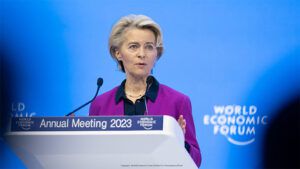A plan to make Europe “the home of clean tech” and encourage green investment on the path to net zero has been unveiled at the World Economic Forum in Davos.
In a speech last week, EU Commission president Ursula von der Leyen (pictured) launched the Green Deal Industrial Plan, which she said tackles the regulatory environment, financing, skills and trade, and which aims to compete with the US Inflation Reduction Act launched last year, in order to keep clean tech production and investment in Europe.
“We have a small window to invest in clean tech and innovation to gain leadership before the fossil fuel economy becomes obsolete,” she said.
“We have a compelling need to make this net-zero transition without creating new dependencies. And we know that future investment decisions will be taken depending on what we do today…We have a plan, a Green Deal Industrial Plan, our plan to make Europe the home of clean tech and industrial innovation on the road to net zero.”
In order to facilitate the necessary regulatory environment, the EU Commission has put forward the Net-Zero Industry Act, which will set goals for clean tech by 2030 along the supply chain, looking at how production can be simplified and fast tracked.
To stay competitive for investors and counter the lure of foreign subsidies, the Plan is also introducing tax break models and providing extra state funding through a European Sovereignty Fund.
von der Leyen noted: “To get ahead of the competition, we need to keep investing in strengthening our industrial base and making Europe more investment- and innovation-friendly.
“It is no secret that certain elements of the design of the Inflation Reduction Act (IRA) raised a number of concerns in terms of some of the targeted incentives for companies.
“This is why we have been working with the US to find solutions, for example so that EU companies and EU-made electric cars can also benefit from the IRA. Our aim should be to avoid disruptions in transatlantic trade and investment. We should work towards ensuring that our respective incentive programmes are fair and mutually reinforcing.”
